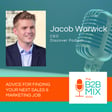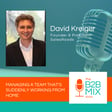Become a Creator today!Start creating today - Share your story with the world!
Start for free
00:00:00
00:00:01

Executive Coaching for CMOs
If you're a CMO or someone who has the C-Suite as part of your career path goals, we've got an episode for you. We spoke with Julie Zadow, CMO in Residence for Demand Spring, on the topic of executive coaching for CMOs.
Julie breaks down how CMOs can benefit from an executive coaching relationship. We discuss:
- observations about interest in executive coaching in 2020
- how coaches and mentors are different and what season of your career warrants coaching
- why an external confidante is so important
- how a coach can help a CMO take his or her organization to the next level
- the personal benefits of a coaching relationship when it comes to getting nudged out of your comfort zone or working on your emotional intelligence
- And more
Want to connect with Julie?
You can email Julie (listen to the episode to grab that email address) or reach out to her on LinkedIn.
__
About The B2B Mix Show:
The B2B Mix Show with Alanna Jackson and Stacy Jackson is brought to you by Jackson Marketing. Need help with your B2B online presence? Let’s talk!
Connect with us on social media:
The B2B Mix Show — Twitter, Instagram, LinkedIn, Facebook
Transcript
Introduction to B2B Mix Show
00:00:00
Speaker
Welcome to the B2B Mix Show with Elena and Stacey. In each episode, we'll bring you ideas that you can implement in your sales and marketing strategy. We'll share what we know along with advice from industry experts who will join us on the show. Are you ready to mix it up? Let's get started.
Meet the Co-Founders: Stacey and Elena Jackson
00:00:19
Speaker
Hey everybody, this is Stacey Jackson. And I'm Elena Jackson. We're the co-founders of Jackson Marketing. And in case you still haven't heard, we are also sisters. Stacey, what are we talking about today? Today is an episode for you CMOs out there.
Why Do CMOs Need Executive Coaching?
00:00:35
Speaker
We are talking about executive coaching and we have an executive coach joining us to talk about why this is so important and how it can be beneficial to your career.
00:00:47
Speaker
Lana, what did you think about the topic when we first tossed it around? What do you think about executive coaching? You know, I don't really think about it that often, to be honest with you, because I just think, Oh, well, you know, they're the executives, they're in charge, they know what they're doing, they're getting everything done and blah, blah, blah, blah, blah.
00:01:05
Speaker
But you don't think about the fact that maybe they need some coaching as well and that maybe they need someone to help kind of shed some light on areas that they need to improve on so that the company as a whole can improve. So I just, I don't think about it that often, but it's something that is definitely needed for a company to continue moving in the right direction, right?
00:01:28
Speaker
Yeah. And not just that, but to continue improving as, as an executive yourself, whether it's your personal interactions with people on the job or how you move to the next level.
Introducing Julie Zaybao: Executive Coach
00:01:42
Speaker
And maybe some people feel like, Oh, if I need a coach, then there, maybe I'm, I'm showing a weakness or something, but you know, even the best top athletes out there still have coaches and get coaching. And that's why they're at their peak performance.
00:01:57
Speaker
So Elena, would you like to introduce our executive coach expert today? Absolutely. It would be my pleasure. Julie Zaybao brings over 20 years of marketing leadership experience to her role as demand spring CMO. She has served as the head of marketing and CMO for various software services and advisory organizations in the New York and Boston regions. And she is also the founder of pinch hit CMO, a fractional marketing leadership firm.
00:02:26
Speaker
Julie is a big picture business strategist who focuses on the intersection between business goals and marketing ROI. She is deeply skilled in digital transformation strategy, modern marketing organizational design, and marketing employee engagement best practices. She also coaches marketing leaders to help them manage their tone, their teams, and their time more effectively so they can become the best leaders they can be.
00:02:52
Speaker
Julie's success as a marketing executive coach is rooted in her experience building marketing departments from the ground up, launching new brands within established companies and marketing with C-suite leaders to deliver marketing that drives business results. Julie, welcome to the B2B mix show. Well, thank you very much for having me. We're excited to have you on. Oh, sorry.
00:03:17
Speaker
I was just about to say the same thing. Thanks for joining us. Julie, before we get to talking about executive coaching for CMOs, is there anything you'd like to share with our listeners about demand spring and your role there as CMO in residence?
Impact of the Pandemic on CMO Coaching Demand
00:03:31
Speaker
Oh, sure. And thanks for asking. So as your introduction to me mentioned, I am the founder of a fractional marketing leadership agency called Pinch Hit CMO.
00:03:41
Speaker
But about a year or so ago, I merged that with DemandSpring. I had been on DemandSpring's board of advisors. And when I really got a sense for sort of what DemandSpring was and is, which is basically what I like to call a revenue marketing consultancy. So we help our clients figure out how to most successfully integrate their strategy, content, and technology needs to really build what we like to call a revenue marketing powerhouse.
00:04:09
Speaker
very similar to the objectives I was trying to achieve as what I call a pinch hit CMO as a fractional marketing leader with some of my clients and the opportunity to sort of fuse that and specifically I'm sure we'll talk about that fuse some of the work that I do with marketing leaders into the demand spring platform was just a great opportunity and I've been full time with demand spring for about a year now.
00:04:33
Speaker
Okay, so you bring a lot of experience then you know what you're doing and you know a lot about executive coaching. So let's kind of dig into that. So executive coach coaching has been around for a while. But I assume that with all the craziness that's been happening this year with the pandemic and related economic impact, it's had an effect on the demand for those types of services. So what have you observed as far as like CMOs, their interest in executive coaching at this point in time?
00:05:01
Speaker
Yeah, it's a great question because obviously, I think if I had a nickel for every time someone suddenly used the phrase, the new normal, I could probably almost buy myself a car at this point. It speaks to the fact that we all kind of sort of knew as leaders in business that
00:05:19
Speaker
We often feel like we were operating without a net. And among the many things that the pandemic has done is solidify that very truth, which is we are operating without a net. And for any kind of leader in business, that is an especially exposed feeling. And most leaders don't like to rumble with feeling exposed, but that's exactly
00:05:41
Speaker
what leaders need to integrate into their truth to lead successfully at a time like this. And I find that specifically for the CMOs and the marketing leaders that I coach grappling with what it means to be OK with not knowing what's happening and still figuring out how to calibrate what it means to lead and to challenge people and to inspire people and to keep a team engaged. It's just harder than it's ever been before. And executive coaching is
00:06:10
Speaker
sort of a partnership for a CMO to help them, you know, keep the ship straight, especially when they're not really feeling like a captain and the seas are very choppy. Yeah. And like the word you used exposed, that just speaks volumes because everyone feels exposed at some point and wherever they are in their career. But as the CMO or an executive, you probably feel a little bit more vulnerable if you feel exposed, right?
00:06:37
Speaker
Yeah. And I think CMOs are probably the most vulnerable to vulnerability of any executive in the C-suite because whereas for most C-suite teams, it's probably fair to say that at any given moment, you know, the other members of the C-suite team might not have a great deal of insight into what say the chief information officer is working on or what the chief legal officer is worrying about. But because marketing is front and center in out there for the world to see,
00:07:07
Speaker
it becomes the piece of the business that for better or for worse everybody has an opinion on that definitely marketing leaders like i said i think the most vulnerable to vulnerability of every other c-suite
Misconceptions About Marketing as a Cost Center
00:07:20
Speaker
leader.
00:07:20
Speaker
Right. And a lot of people seem to say, oh, if anything has got to go, it's got to be something about marketing when times get tough. And that really needs to change because we have so much technology and strategy and opportunity and precedent just over the last five to 10 years to actually calculate marketing's impact on sales forecasted pipeline. But you're absolutely right that there is this
00:07:48
Speaker
legacy thinking, sometimes in more traditional firms with longer standing C-suite teams, that marketing is a cost center. So when times get tough, cut the budget. When actually successful firms are the ones that either A, don't cut marketing in tough times or actually double down on recognizing that this is their chance to play a long game.
Mentor vs. Executive Coach: What's the Difference?
00:08:07
Speaker
Right. Let's go back to before the new normal and the 2020 turmoil aside,
00:08:14
Speaker
So a lot of people talk about having a coach or having a mentor, and they may use those terms interchangeably, but they're actually kind of different, at least in my opinion. How would you define the difference between an executive coach and a mentor? And are there different seasons in your career where you may need one more than another?
00:08:36
Speaker
Yeah, that's a really interesting question and actually one I haven't been asked before, so I'm really glad that you did. To me, let me tackle the first part of the question, which is what's really the difference between a mentor and a coach? And this is how I would describe it, which sort of lends itself to my opinion on at what stage in your career you might need one more than the other.
00:08:58
Speaker
But mentors historically are a person someone would seek out because they're looking for someone who is in the role they are in but more experienced in that role or in the role they would like to get into when they're trying to figure out a path forward. And the mentor's role is usually to do a higher balance of the talking than the listening. And the mentee's role is to do a higher balance of the listening than the talking because the mentee is trying to learn directly
00:09:27
Speaker
from the experiences of the mentor to help them calibrate their own career direction so that to me is sort of the mentor-mentee relationship when you get to the relationship between a client and an executive coach the balance changes a bit. In the sense that traditional executive coaches don't necessarily have to have any direct connection
00:09:47
Speaker
or experience in the professional field of their clients. And many executive coaches go out of their way to point out, what makes me good at what I do is I don't need to have done what you do to basically ask questions of you, get you the client to do more talking, to help you find your own way more successfully. So whereas a mentor is more about sharing their own experiences to educate a mentee,
00:10:15
Speaker
I'd say an executive coach is a little bit more about listening and shaping and responding and challenging to help the client in this case figure things out for themselves.
The Role of an External Confidant for CMOs
00:10:25
Speaker
That being said, what I do as a marketing executive coach effectively splits the difference on those two definitions. And I predict that in the next 10 years, you'll see a lot more of this particular kind of executive coaching. What I mean is I love the work I do with marketing executives
00:10:45
Speaker
CMOs marketing leaders to help them be the best version of themselves that they can be but I am perfectly clear about the fact that in my roster of clients Nowhere will you find an astrophysicist who I'm helping to build a better rocket ship I focus on marketing and the reason I broke it there is that is my personal expertise so as a marketing executive coach the version of executive coaching that I happen to be offering is more of a blend of
00:11:15
Speaker
mentor-mentee style communication and client executive coach experiences because of the fact that I have walked in their shoes and part of my executive coaching style is to share my experiences to help people but also as an executive coach it's my job to challenge people as well as along the way.
00:11:37
Speaker
I think that's a really good definition of how you broke those up because I haven't really thought about it that way. Like the coach is really asking the right questions to get you to dig deep and kind of follow through your own path and figure it out, right?
00:11:54
Speaker
Yeah, exactly. And that actually supports the second part of your question, which is, I think it takes people a couple of years in their own careers to get to the point where an executive coach could be asking them questions and they realize they may have many more of the answers within than they realize. So in my opinion, I will say that I think a mentor can be a super useful resource for people more junior in their career. And I think an executive coach naturally becomes a more useful resource, the more senior you become in your career.
00:12:23
Speaker
One resource I read when I was thinking about questions to ask you was talking about the difference between mentors and executive coaches. And they said a mentor might be like that trusted friend where you get advice, whereas an executive coach is more like maybe a therapist who helps you draw the questions out of yourself.
00:12:42
Speaker
Yeah, and I think that's very true. Executive coaching nowadays is really about working with a client to sort of call out their blind spots as you start seeing them based on what you hear from them, so that you can help them fix them. And
00:12:56
Speaker
You know, I've got to be honest with you. When I'm talking to my own closest friends, I'm always trying to read whether what they're looking for is just a little air shoulder to cry on or whether they really want me to challenge them on what I'm hearing. So they sometimes your role in life is to just be empathetic to someone who needs a listening ear. I go out of my way with my coaching clients to say that I have a very empathetic style, but my role as an executive coach is to challenge them.
00:13:23
Speaker
And we've, we've touched on some of the value that a CMO can receive from working with an executive. But one of the benefits that you've written about on the demand spring, getting tongue tied on the demand spring blog is that as a CMO, you have a trusted and external confident when you work with an executive coach. So why is that really important?
00:13:44
Speaker
Well, I would say that many people are blessed with having super strong internal relationships at work. They may be wonderful leaders who have a really strong team of, say, directors or VPs reporting into them. They may have a really tight connection with their C-suite. But on some level,
00:14:04
Speaker
Challenge happens. Difficult conversations need to be spoken and heard. Things can go awry with a trusted employee internally. It's not always the wisest move when you're feeling, to back up what we said earlier, exposed, vulnerable, or frustrated, or confused, or anxious to necessarily use an internal resource as your best confidant to vent that. Some of
00:14:33
Speaker
learning to be a really successful marketing leader is understanding other people's vision of who you are to the strength of the organization. I think in order to really lead with that strength, you need to have an outlet for your vulnerability when you're not actually sure what to do. But more often than not, an internal confidant is not the best resource to vent your
00:14:56
Speaker
personal anxieties about the direction of the business or what you're feeling and experiencing as a leader because it can backfire. None of us enjoy politics at work, so to speak. Therefore, I think it's really important to be careful about the confidence you keep at work, especially if you're, say, having a challenge with another senior-level executive.
00:15:16
Speaker
If you choose an internal confident within your organization to vent your frustrations with working with someone that person works with as well your intent might be pure that you could use some advice but the impact.
00:15:31
Speaker
of your intention could actually lead to some politics down the line that was not your intention. An executive coach is a trusted business confidant who's removed and disconnected from your day-to-day work environment. So it's someone who can hear your ideas and your opinions and your frustrations sort of independent of the organization you work in.
00:15:51
Speaker
And that's a good point because you can set yourself up in a predicament where you're perceived one way when you're not really trying to be that way, but you need to talk to somebody about it. So I think that that's where that executive coach would be highly beneficial for the CMO to have that.
00:16:10
Speaker
Yeah, and a lot of it is helping people recognize the difference between perception and reality in the moment. And executive coaching has a lot to do with helping people see things through different lenses than just their own. Hey, folks, let's take a break to hear about today's sponsor.
00:16:31
Speaker
And back to that internal versus external kind of guidance that an executive coach can bring to a CMO. With an executive coach, a CMO can get support, not just on politics, but actually how to
00:16:49
Speaker
pull great ideas out and stress test vision of what they want to present to the company or a plan they want to move forward with. Can you tell us a little bit more about how that works with an executive coach?
00:17:02
Speaker
Yeah, so I have found that leaders as they ascend the corporate ladder have to be really careful about how challenging it can be to not turn an entire team of people into, yes, women and men. And that mostly has to do with, as leaders, we're often trying to foster
00:17:21
Speaker
collaboration and you know the goal of collaboration is often agreement but in the kind of side tracking ways of trying to be expedient i often find that marketing leaders will lead with something that they see in their minds.
00:17:37
Speaker
and two quickly their team of people within their marketing organization immediately support the idea why it's coming from the boss and then they'll sidetrack their way around trying to figure out what the boss really meant and whether that was really the right direction to go.
00:17:52
Speaker
So one of the things that I often coach my clients on is having them use me as their executive coach to sort of get those ideas out of their head and take a little time to mold them and shape them together so that we can sort of give those ideas a little room to breathe and maybe a little room to reshape.
00:18:12
Speaker
So by the time the executive is ready to bring them back to their team, they're really in a position to know they've thought through this idea, they've crystallized it in a way that it's more than an idea. It's an intentional vision and they're ready to really set the stage to engage the people around them. So it's about, I would say, taking an idea and framing it from both the perspective of communication and impact.
00:18:40
Speaker
And that's a step that too many executives in their busy days, especially in marketing, often otherwise rush past. And it's a little bit of using an executive coach as a slow down to speed up strategy to ensure that when you're communicating a vision, it's ready for airtime.
Personal and Professional Growth Through Coaching
00:18:58
Speaker
You know, that's interesting what you said about the team might go along with the idea just because they're, they came from the boss. Do you ever advise CMOs about how to maybe get their team to be more honest with them or how to get them to communicate with their team so they feel that they're able to be honest when they think an idea is bad?
00:19:23
Speaker
Yeah, and that to me is sort of taking the power of recognition and contextualizing it to put your money where your mouth is, so to speak. One of the things I have recently coached one of my clients on for whom it's really important to get real-time feedback from his executive team is to actively call out his appreciation for people who challenge his ideas. And as long as they're doing it in a respectful way to recognize that better teams
00:19:53
Speaker
are open to conflict from an idea generating perspective in order to find their way to the most useful or powerful direction that they could take so for example this particular marketing leader you know we've had these conversations around what it means to not just.
00:20:11
Speaker
tell people on the team how much he values their feedback and dissent when it's what they feel they need to express, but actually calling it out and recognizing it in such a way publicly that other people see it as a value. So that kind of taking it one step further as opposed to something you say matters to you, calling it out when you see it in real time and communicating it broadly as an example of the type of behavior you'd like to see more of, that's the kind of thing that can really make a difference.
00:20:41
Speaker
So as an executive coach, you help CMOs in their professional development, but I would assume that it also is personal development in their career paths that you're helping them with. So what are some of those things that they might get out of it? Like you maybe you act as an outlet for you to voice your fears or help them find their blind spots, nudge them outside of their comfort zone. What are some of the things that
00:21:07
Speaker
you see as being beneficial for that for their personal development and career paths.
00:21:12
Speaker
Yeah, one of the things that is so challenging about being a CMO nowadays is the degree to which the job, if you're not careful, can really take over your entire being. And it becomes what feels like a 24-7 commitment, even if you are sneaking off hours to sleep, eat, and occasionally take a run. But the fact of the matter is, I have worked with way too many CMOs
00:21:38
Speaker
who are so good at seeing the goals they are trying to get their teams to achieve internally, but they're somehow sort of paradoxically way less focused and less clear when it comes to sort of defining the scope of where they are trying to go as leaders, what their goals are, and to really be honest with themselves about whether the environment they're in
00:22:02
Speaker
supports the type of leader that they need to be. I often am amazed at how many CMOs I talk to who tell me that their career progression, although impressive, has been largely reactive. They basically took advantage of a headhunter call. They got a call from someone they used to work with who moved to another company when there was suddenly an opening at their company. There's nothing wrong with these moves, but one of the things that I try to challenge my
00:22:30
Speaker
executive coaching clients on is to ensure they are the map maker of their own career map and that they are taking more accountability maybe and responsibility for mapping their career vision into an actual plan to achieve it. Very few CMOs I speak with are 100% content with where they are and what their job is.
00:22:54
Speaker
And therefore i think that they're very prone to reactive decision making when an opportunity to maybe jump ship or try something new comes along one of the things i really like working with cmo's on is helping them think about. You know what it means to to chart their own path forward in their career and to call themselves out on whether they've done that or not yet and talk about whether they're ready to start doing it now.
00:23:21
Speaker
So one thing I noticed in the blog post you wrote for Demand Spring about executive coaching is that an executive coach can help a CMO calibrate their emotional intelligence. And I think with the whirlwind of a year that we've had, there's a lot of things hurting maybe their team members, hurting them as CMOs themselves.
00:23:44
Speaker
even all the social unrest that we're seeing around the world, how do you advise your CMO clients to be open and empathetic and calibrate their emotional intelligence? Yeah. Gosh, I think one of the most challenging things of late is figuring out how to be honest with
00:24:08
Speaker
leading with the idea of, hey, folks, I'm going to be honest with you. Today, I'm not feeling OK. Today, I'm feeling scared. Today, I'm feeling overwhelmed. Or to be able to look at the people on your team and say, hey, we have so much on our plates, and we are trying to achieve some super impressive things. But guess what? We're in the middle of a global pandemic. If you need to take a moment or take a beat or take a day, come talk to me. Let's figure out how we
00:24:35
Speaker
really infuse some honest and raw humanity back into how we figure out what we as individuals and as a team are going to accomplish in these crazy unprecedented times. I don't know. I think for leaders,
00:24:48
Speaker
It's sort of self-awareness in two areas. A lot of leaders get so focused on just the path forward that they lose sight of their own emotional state as they go. And that's a problem because the team around them is constantly looking at them and trying to glean their emotional state to help them get a sense of what to expect next. But I think the other area that is so important is
00:25:13
Speaker
I'll reference the phrase slow down to speed up but slowing down enough to really develop an authentic empathy to the emotional states of your colleagues it's business does not move forward in a robotic vacuum we are humans at work and now more than ever taking the time
00:25:36
Speaker
to be aware of your own emotional state and to be authentically empathetic to the reality of the emotional states of not just your customers, but your colleagues and the people who work for you. That is a critical part of ensuring that people even believe they can show up as at least a B plus version of themselves that work every day and move forward.
00:25:58
Speaker
And especially for those that have young kids at home that they can't send them to camp or anything right now, they're trying to juggle a lot of things that maybe they didn't have before all at the same time. So being able to feel like everything's okay and that you get that leadership in place from the CMO that always is helpful.
00:26:17
Speaker
Yeah, one of the things I said to one of my coaching clients just this past week was, you know, we need to make sure you're doing everything you can as a leader to make every member of your team believe it's okay to show up with their whole human self at work every day, because that's where we are as a human race right now. And that's the way you need to lead.
Promoting Diversity and Inclusion with HR
00:26:34
Speaker
You know, I was reading the other day about the Black Lives Matter movement and the concerns of African Americans at work who say they don't feel like leadership is necessarily aware of why they're feeling emotions.
00:26:51
Speaker
or can't separate their emotions about what's going on in the world with like George Floyd and their work life. So I think even like diversity and inclusion and some of better awareness about what people of different backgrounds are feeling has to be part of this whole emotional intelligence and awareness as we move forward, if it's not already part of your leadership style.
00:27:17
Speaker
Oh, I couldn't agree with you more. It's one of the reasons that I often counsel CMOs to build a true partnership with their chief human resources officer, the CHRO, the head of HR inside their organization. I mean, nowadays, the only way an organization can really build an authentic brand is from the inside out to have a truly honest, authentic corporate culture on the inside.
00:27:42
Speaker
that creates humans who can personify your brand to the outside world. And that goes beyond the marketing organization at this point. So to some degree, I think the best opportunity to start building new bridges there is for the CMO, for example, to start treating the Chief Human Resources Officer almost like
00:28:01
Speaker
a super important internal client if that's the person leading the charge inside your organization to help the entire company become more aware to think about the goals of diversity and inclusion you find a way to partner with those people because you are the. Person who leads the group of people who most know how to take a message and bring it to a larger group so work with your chief human resources offers help them where we do that internally
00:28:29
Speaker
And by extension, you'll be building a better and more authentic brand along the way.
Are CMOs Like Athletes?
00:28:34
Speaker
Yes, definitely. So Julie, before we ask you our Just for Fun question, are there any other tips or advice that you'd like to leave our listeners with when it comes to CMOs seeking executive coaching relationships?
00:28:48
Speaker
Yeah, I guess I'll say two things. I do sometimes still see CMOs who worry about spending money on themselves, if you will, because obviously an executive coaching relationship is a budget line item on some level.
00:29:04
Speaker
I'll tell you that i have a lot of clients that put executive coaching under marketing leadership advisory you know but the fact of the matter is your organization is asking you to step up to the plate and be the most incredible version of yourself at the highest level performance everyday if you look at other disciplines let's take.
00:29:22
Speaker
athletics, for an example. Like, could you ever imagine a Tom Brady or a Serena Williams operating at their peak level without a coach? It would be impossible. But in the same way, CMOs are being asked to deliver peak performance every single day. So why would they expect to do that without a coach? So I asked them to think about that. And then, you know, the second thing I would say is Marshall Goldsmith, who's probably one of the world's most famous and long recognized executive coaching
00:29:50
Speaker
Uh, has a book, the title being what got you here won't get you there. And I love that phrase and I use it all the time because I think one of the things that CMOs have to recognize is they've gotten to where they are because of what they have already demonstrated they're good at. But in order to really be a CMO right now who is successful,
00:30:11
Speaker
who is happy and who is engaged and who is thriving. You probably don't have both the necessary and sufficient set of qualities you need to move forward. So embrace the idea of what got you here won't get you there and think about how a coach could help you fill in for the gaps.
Julie's Dream Job and Contact Information
00:30:28
Speaker
And it's there's so many things that are constantly changing to a marketing so you can't just keep doing what you've always done you have to learn new things.
00:30:36
Speaker
Amen. The only thing that's so true. So we have a just for fun question. So if you weren't CMO in residence at demand spring, what would your dream job be? I love that question. I will tell you for many years.
00:30:51
Speaker
when i thought about that i would often say that my dream job would be to be an international resort critic greatest job in the world but if i would give you the answer that i just came up recently which i had a good laugh out of but i have to admit that in the kind of fantasy world imagining,
00:31:10
Speaker
you know, your dream job, it did resonate with me. So my husband and I are big fans of the show Billions. Do either of you happen to watch Billions? So great characters, great writing. Actually, you know, the fantasy character for me on that show without question is Chef Ryan, the chef who lives inside their house and makes beautiful meals without them actually quite realizing they were hungry yet, but they're perfect and there it is. So I have a huge fantasy in life.
00:31:37
Speaker
happy chef running in my world someday. But my husband and I were recently watching an episode and the character Wendy Rhodes had basically just helped one of the investment bankers see the light of the truth of their blind spots and given them a pretty quick dose of medicine on what it means to fix them. And my husband turned to me and he said, I think that's your fantasy dream job. I think you want to be Wendy
00:32:03
Speaker
There's a flavor of when he wrote it that I fantasize being some organizational psychologist with all of the chutzpah necessary to help people see the light whether they want to see it or not. Well, Julie, thank you so much for taking time to talk with us today about executive coaching for CMOs. If our listeners would like to connect with you or follow you online, is there a best way for them to do that?
00:32:30
Speaker
Sure, just reach out Julie at demandspring.com. I'd love to connect and chat. And we'll include that in these show notes. And make sure to go follow and connect with Julie on LinkedIn as well and any other social that you can find her on. And if you want to get in touch with me or Stacy, you can hit us up on social. On Twitter, you can find Stacy at Stacy underscore Jax. That's S-T-A-C-Y underscore J-A-X. You can find me at Elena underscore Jax. That's A-L-A-N-N-A underscore J-A-X.
00:32:58
Speaker
And if you're not a Twitter fan, we are also on LinkedIn. Look us up. And finally, don't forget, you can also leave us a voicemail on the Anchor mobile app or on our anchor.fm show page. See you next time. And we are back.
















